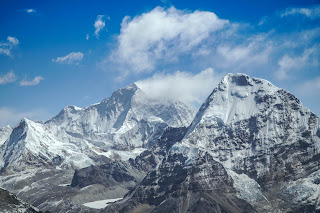This is probably one of the best books I’ve
read in my life.
Across
Many Mountains is an
extraordinary read about resilience and following one’s path in life. Even
though we belong to different cultures, I experienced a profound spiritual
connection with the three women portrayed in the book cover: grandmother,
mother and daughter.
Invigorating, memorable, astonishing are some
of the adjectives I can use to describe this reading journey to understand the
Tibetan culture and plight under the oppression of the Chinese government, as
well as the intricacies of the hybrid Swiss-Tibetan culture.
Kunsang is Yangzom’s grandmother, a Buddhist nun who
led a peaceful existence in a mountain monastery with her family, until Chinese
soldiers invaded Tibet in the 1950s. Chinese soldiers had no respect for
Tibetans’ lives, and they committed all kinds of atrocities. They destroyed everything
in their path. They vandalized homes and monasteries; they killed animals and
people. It was clear to Kunsang that she and her family would not survive such
an invasion, so she convinced her husband, a Tibetan monk, that they had to
escape to India.
It was not an easy plan.
Imagine yourself trekking the Himalayas
without proper shoes, with hardly any food and no money. Starvation and misery
awaited them. The only thread of hope they clung to was the thought of a new
life in India. Their spiritual strength propelled them forward despite the dangerous
risks involved due to the presence of Chinese soldiers lurking close by. These violent
men were prepared to catch and assault them to prevent them from fleeing from Tibet.
Across Many Mountains shares every
detail about Tibetan culture. There is no sugarcoating in her descriptions, and
we also witness their struggles in India as the refugees toiled to make ends
meet under the abuse of employers who took advantage of their desperation. Kunsang
lost her husband and one of her children during this excruciating period of
their lives, but she carried on with her only daughter left: Sonam.
Kunsang and Sonam managed to survive in
different places in India. When Sonam was a teenager, she worked as a waitress
at a luxurious restaurant in India. That was when she met a Swiss student of
anthropology who fell madly in love with her. His name was Martin Brauen. With their
extremely different cultural backgrounds, their challenges appeared to be as
insurmountable as trekking the Himalayas as refugees, but tolerance, patience
and respect proved to be invaluable in their relationship and the understanding
between both families.
The Chinese government fabricated a narrative
to justify their cruelty in Tibet, a scheme that Vladimir Putin also used to
invade Ukraine. It is the way tyrants proceed, but, unlike Ukrainians, Tibetans
had no outside support or help to fight against the Chinese soldiers.
The
Chinese government claimed to "modernize" Tibet. However, in the year 1986, when
the exiles were allowed to visit Tibet, Kunsang and her family found that the
villagers had no access to running water. They had no toilets and no baths. The
air was heavily polluted by Chinese factories; the precious forests that had cheered Sonam's childhood had been
cut down.
“Though the rugged ridges of the Tibetan
Alps were the same, the rest of the landscape was different from that of her
childhood. Much of the deep forest had given way to scarred, rocky slopes or
weed-choked valleys. The Chinese had chopped down the once never-ending wealth
of trees, transporting them back to a motherland greedy for construction
material and fuel. They did not replant the forest.”
The Chinese government meticulously suppressed
the Tibetan culture and restricted the freedom of Tibetans’ citizens.
Abductions, torture, persecutions are part of the system imposed by the Chinese
government since the beginning of the
invasion. The author explains how Tibetans are monitored when they try
to communicate with their relatives overseas.
“Everyone knows that phone calls are
tapped and regularly cut off when the wrong subjects are mentioned. All too
often Tibetans who have made calls to the West receive visits from the police.
As in all dictatorships, any contact with foreigners is treated as suspected
espionage. The only difference in this case is that the international community
doesn’t classify the People’s Republic of China as a dictatorship, even though
there are no elections and no self-determination for the various nationalities,
no right to freedom of expression, no free press, no unmonitored contact with
the rest of the world, and no independent justice system. Any small state that
restricted its citizens’ rights so strongly would be ostracized by the
international community, yet the rest of the world courts China’s favor and in
2008 allowed it to present itself as a peaceable host of the Olympic Games…”
Yangzom Brauen, the author
of Across Many Mountains, was detained in Moscow for protesting against
the decision to hold the Olympics in Beijing in the year 2008 . Thankfully, she was soon liberated
with the help of the Swiss Embassy.
The lives of Kunsang, Sonam and Yangzom unfold
gracefully in the voice of Yangzom, whose prose stimulates the intellect,
paints vivid scenes of their experiences and reveals the personal transformations
that ensued after Sonam and Kunzang moved to Switzerland.
I could not put this book down. There is
something surprising on every page, and when I reached the epilogue, I did not
want the story to end. It is the honesty of her writing what makes it irresistible
and gripping.
Across Many Mountains was published in
the year 2012; it would be interesting to read a follow-up book about their lives. Yangzom
Brauen is a very talented writer. You can learn more about her amazing artistic
career by visiting her website.
Feel free to check these articles and websites related to the blog post, to learn more about the topic:
https://savetibet.org/major-ict-reports/
https://www.rfa.org/english/news/tibet/land-10142021182417.html
https://www.hrw.org/world-report/2022/country-chapters/china-and-tibet


